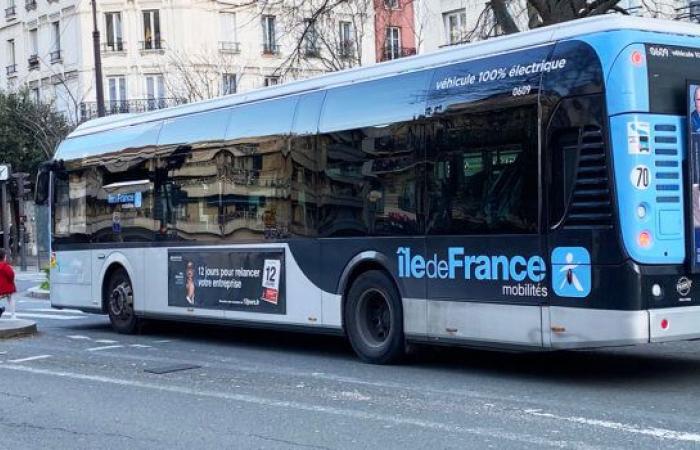
Watch out, big bang coming in Parisian transport. This Tuesday, November 12, the board of directors of Île-de-France Mobility (IDFM), chaired by Valérie Pécresse, must validate the buyers of the first three batches of privatized buses in the capital and its inner suburbs. Exit the Epic (public establishment) RATP, an integrated company which has managed the surface network and the metros since the Liberation. Unless there is a surprise, it is its private subsidiary CAP Île-de-France, through dedicated companies, which will take over the operation of lots 42 (Asnières and Pleyel sites) and 45 (Neuilly-Plaisance, Saint-Maur, Neuilly -sur-Marne), for a period of 6 years from 1is November 2025.
Regular sausages from the network
Conversely, Keolis, a private group, would obtain management, via a subsidiary, of lot 9 (Bussy, Villemomble, Tremblay) for the next six years, from 1is august. “Concretely, up to 8 different companies will eventually operate in intra-muros Paris, underlines Céline Malisé, president of the communist group in the region. The current unified network is already experiencing saturation. Who can believe that a breakup will not cause chaos. » Especially since no impact study has been provided for this formal salami of the network. Ultimately, the 308 bus lines in the capital and its inner suburbs will be divided into 13 lots, subject to the rules of public service delegations (DSP) for unequal periods of 5 to 7 years.
In practice, nearly 19,000 agents, or 40% of the Epic RATP workforce, attached to depots, will be transferred for total liberalization planned for the end of 2026. For its part, IDFM, the mobility organizing authority, wants to be confident: “The conditions of transfer are guaranteed by a territorialized social contract. There will be no loss of salary”assures its first vice-president, Grégoire de-Lasteyrie. Employees are guaranteed, for the duration of the first DSP contract, a fixed remuneration and affiliation with the RATP pension fund. But that's all.
Social dumping with slashed prices to win tenders
“Agents must accept this transfer, before knowing the working conditions, otherwise they are dismissed for personal reasons and do not receive unemployment”deplores Vincent Gautheron (CGT RATP). In this approved activity with capped and structurally low margins that is urban transport, the payroll represents almost 60% of production costs. “The only lever that operators have to generate profits is to set up services in two stages. An agent will work part of his day in the morning. Then return in the evening during rush hour. This organization repulses potential employees”warns the union official.
Moreover, from 2022 and to prepare for competition, the RATP has established a new day schedule, with a time range of up to 13 hours. A measure which would, according to IDFM, not be sustained in the Territorialized Social Contract, which reduces the working hours to 11 hours. However, as Vincent Gautheron recalls, the president of IDFM Valérie Pécresse “asks that agents not accept this provision, otherwise it will lead to the recruitment of 700 to 800 drivers, while recruitment problems are recurring due to the unattractiveness of the professions. »
Furthermore, if the guaranteed remuneration is calculated over the last 12 months before the transfer, differential compensation mechanisms are possible. “Operators respond to calls for tender with slashed prices. However, the latter are often below the real cost of production”explains Vincent Gautheron. Thus the operator can calculate a lower remuneration than that planned during the transfer. Then, every month, pay part of the loss in differential compensation, before regularizing it at the end of the year. “This mechanism is provided for in the responses to calls for tender and allows the operator to have petty cash by playing with the remuneration of agents”continues the cegetist. A vagueness about the salaries received at the end of the month which can put off certain recruitment candidates.
It remains to be seen who pays in the event of a slip-up. IDFM ensures that this differential compensation will be the responsibility of the operators. “It is obvious that these DSPs carry a financial risk. But it is not up to taxpayers to make up for unfulfilled commitments”assures Grégoire de Lasteyrie. However, as Céline Malisé reminds us, “90 million euros in two years of budget extension have been released for the Optil network (inner suburbs, editor's note), so that operators can finalize their budgets and pay salaries. » A mechanism which could not be renewed on the contracts for the former RATP lots, given the financial situation of IDFM according to the CGT. “This led Transdev not to apply for these first lots”assures Vincent Gautheron.
A worrying precedent in the inner suburbs
It remains to be seen the concrete consequences of these upheavals on the daily lives of Ile-de-France residents. In the outer suburbs, from 2021, 120 operating contracts have been grouped into 36 lots of the Optil bus network, before being submitted to calls for tender. “Three years after the establishment of these public service delegations in the outer suburbs, we have acquired expertise, says Grégoire de Lasteyrie. What worked for Optil will succeed in Paris and its immediate suburbs. » This assessment, however, is not all rosy. From Tremblay-en-France to Argenteuil, salary conflicts have exploded in recent months in the networks managed in DSP by Keolis and Transdev in Île-de-France.
In Saclay, Cap Île-de-France (RATP) was unable to meet its commitments in terms of supply, due to faulty equipment recovered from the former operator. In the end, the communist group in the Region figures at “at least 200”the number of buses canceled daily in the greater suburbs. The sections of the PCF were also on Thursday November 7 in front of 150 stations in Île-de-France to raise awareness among users. “Even employers are starting to doubt Pécresse-style privatization”concludes a diligent follower of the file.





